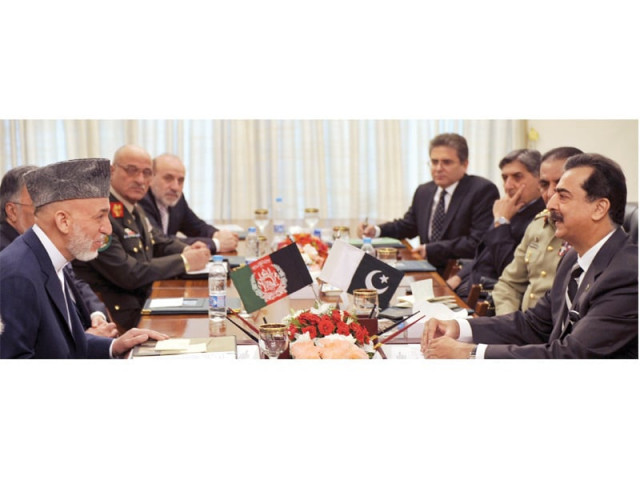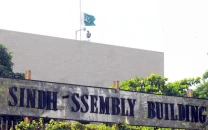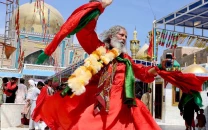Afghan imbroglio: Roadmap for a post-US era
Both sides inaugurate joint peace commission, sign ‘Islamabad Declaration’.

Pakistan and Afghanistan on Saturday inaugurated their joint peace commission tasked to look at the prospects of dialogue with the Taliban, which has been engaged in a decade-long insurgency against US-led allies in Afghanistan.
In another effort to improve bilateral ties, which are often shrouded in mistrust and mutual recrimination, the much-delayed transit trade agreement between the two countries – which was signed last year – is due to come into effect on Sunday (today).
Prime Minister Yousaf Raza Gilani and Afghan President Hamid Karzai co-chaired the first meeting of the Pakistan-Afghanistan Joint Commission for Reconciliation and Peace in Islamabad which was attended by top civil and military officials from both sides.
“The two sides affirmed their resolve to work closely together for reconciliation and peace, in holistic and comprehensive manner,” said a joint statement issued after the session.
In April this year, Pakistan and Afghanistan had decided to upgrade their joint commission by including their army chiefs, spymasters and top diplomats in the panel to make it more powerful.
“Both Afghanistan and Pakistan expressed their commitment to an Afghan-led and Afghan-owned process of reconciliation and peace in Afghanistan and called upon all of Afghanistan’s partners in the international community to support such a process,” the statement said.
The two sides pledged that the joint peace commission would meet again in October and a sub-committee in 20 days to a month to carry forward the process.
They also agreed to enhance cooperation between their militaries and intelligence agencies and to hold separate military and intelligence meetings whenever required. Pakistan said it fully supported the efforts of the Afghan High Peace Council, led by former Afghan president Burhanuddin Rabbani, for promoting peace and reconciliation in Afghanistan.
US officials and the Afghan peace council have stepped up clandestine efforts to engage different factions of the Taliban in dialogue. Though it is not yet known how these parallel talks dovetail, it is clear that they are looking for communication channels with the reclusive Taliban leader Mullah Omar.
Last month’s killing of al Qaeda godfather Osama bin Laden in a top-secret US commando raid in Abbottabad has heightened calls for the administration of US President Barack Obama to broker a peaceful settlement to the imbroglio. And the US is now trying to engage the Taliban senior cadres in talks ahead of the drawdown of US troops from Afghanistan, scheduled to begin next month.
There is a growing realisation in Washington and Kabul that Islamabad can play an important role in bringing the Taliban leadership to the negotiating table. Perhaps this is why the Afghan High Peace Council head also met Pakistan’s politico-religious parties during this trip to enlist their support for the reconciliation process.
Press conference with Gilani
Earlier, speaking at a joint news conference with Prime Minister Gilani, the Afghan president called for joint efforts to eradicate terrorism from the region. “The facts are so bare and the wound is so clear and hurting that it requires both of us to work diligently and extremely aggressively and effectively to curb terrorism and radicalism in the region,” Karzai said.
Asked about hordes of militants attacking Pakistani security forces close to the Afghan border, Karzai said the attacks were “all the more reason for us to work harder to remove radicals from both countries and to remove sanctuaries”.
Premier Gilani, on his part, insisted that his country wanted a stable, peaceful, prosperous, independent and sovereign Afghanistan, saying that Islamabad was ready to provide “whatever support they want” in the Afghan-led peace process.
However, he refused to be drawn in on whether the Haqqani network, the deadliest of all Taliban factions, could be brought to the negotiating table. “We have offered whatever the Afghan government wants from the Pakistan side. We are ready to facilitate,” he said.
In a 23-point ‘Islamabad Declaration’, signed by Minister of State for Foreign Affairs Hina Rabbani Khar and Afghan Minister of Foreign Affairs Dr Zalmay Rassoul, the two countries agreed to enhance connectivity and infrastructure development; initiate cooperation in the sectors of energy, mines and minerals; and significantly enhance cultural, parliamentary, student, youth and people-to-people contacts.
Both sides expressed their satisfaction on the signing and ratification of the new Afghanistan-Pakistan Transit Trade Agreement (APTTA) and the successful finalisation of the modalities and mechanism for its implementation.
They welcomed the operationalisation of APTTA on June 12 and agreed to continue to take all necessary steps to ensure that this agreement is fully implemented and that it contributes to the growth of trade, which has already witnessed a significant increase over the recent years. They agreed to initiate consultations with other interested states to establish trade transit and facilitation mechanisms/arrangements, which would enable their Central Asian neighbours to use overland routes through Afghanistan and Pakistan to the world
There was also an agreement between the two states that the Torkham-Jalalabad Expressway be extended to Herat through central Afghanistan, and to establish a rail link between Peshawar and Jalalabad.
Published in The Express Tribune, June 12th, 2011.



















COMMENTS
Comments are moderated and generally will be posted if they are on-topic and not abusive.
For more information, please see our Comments FAQ